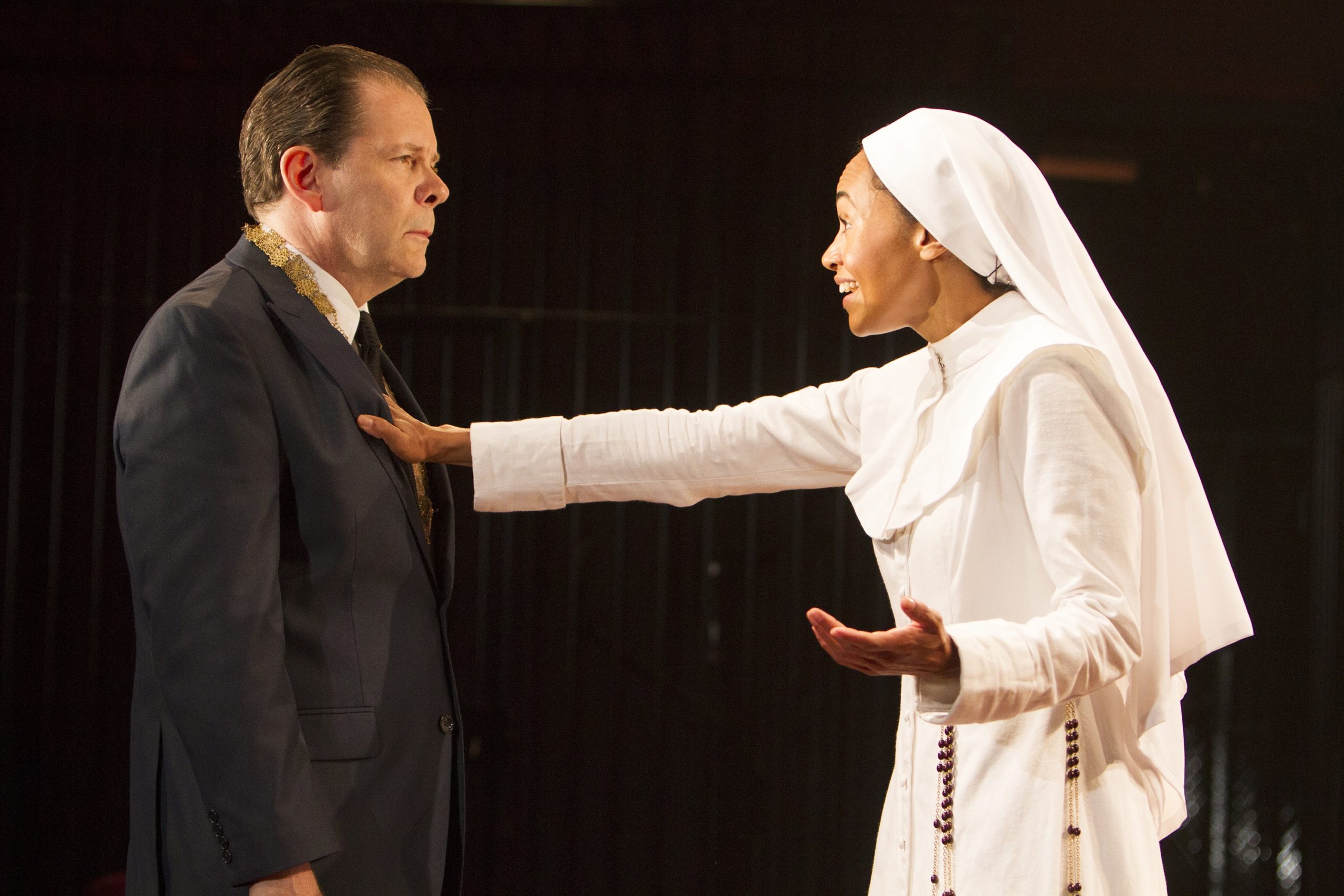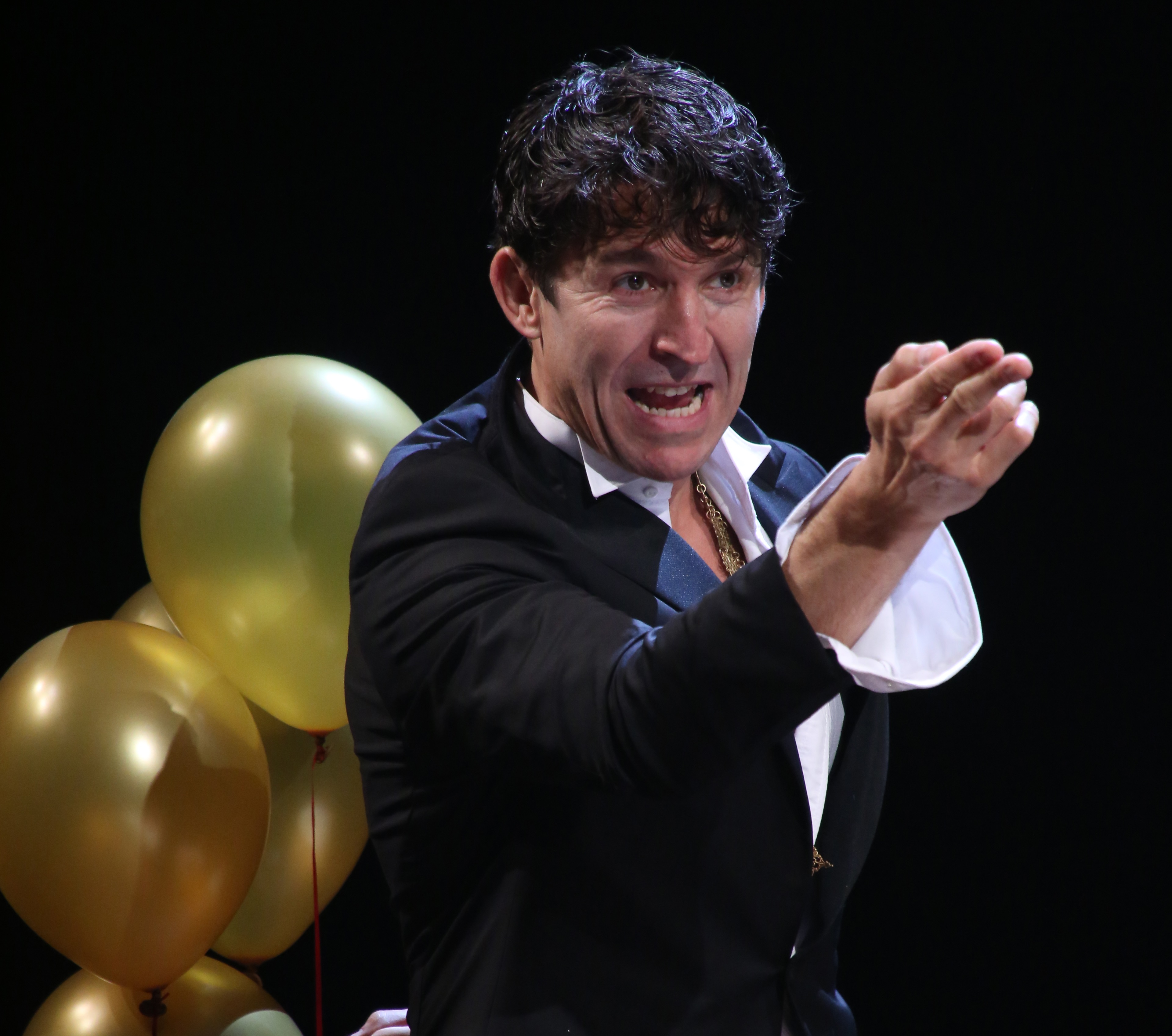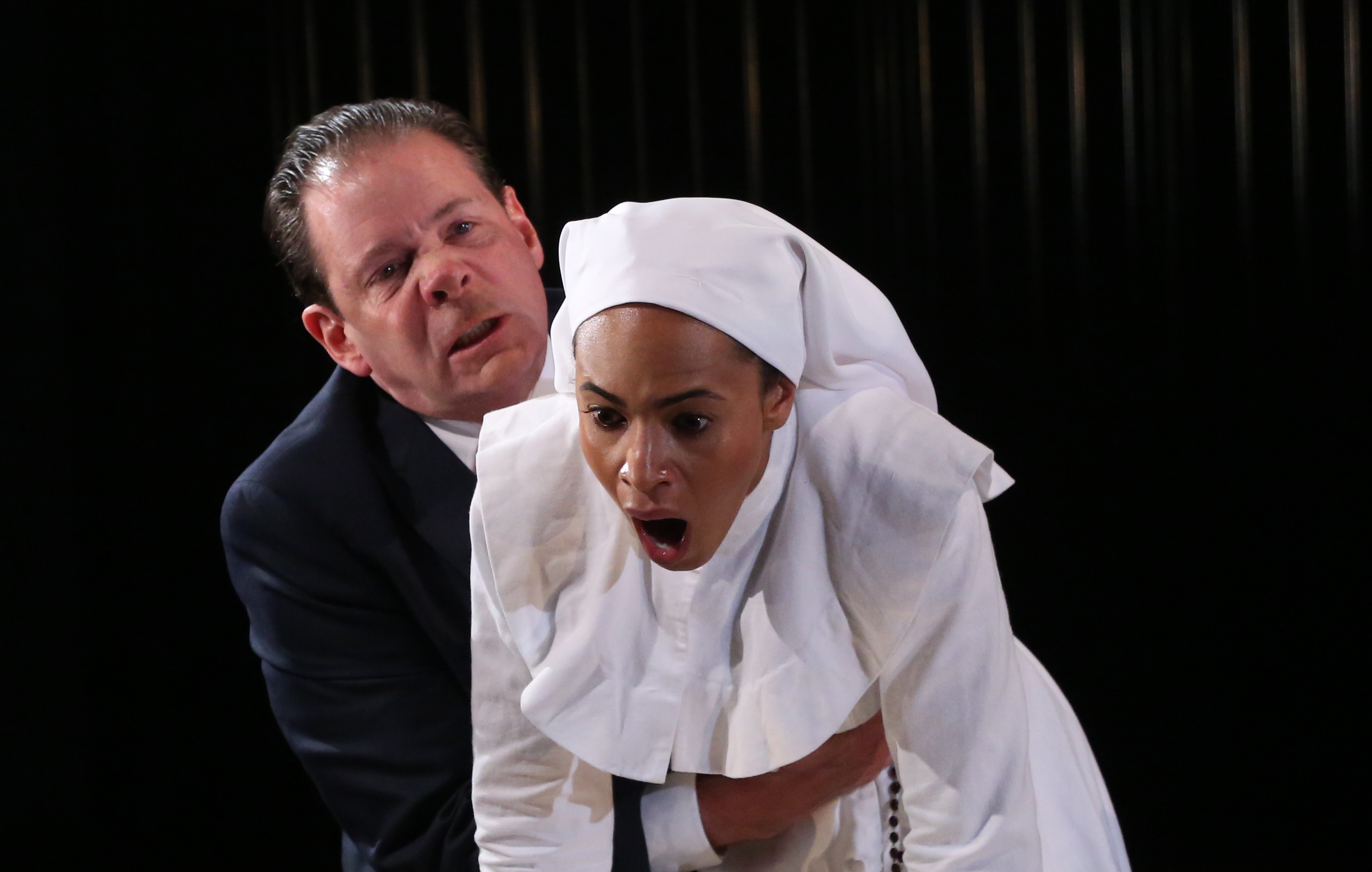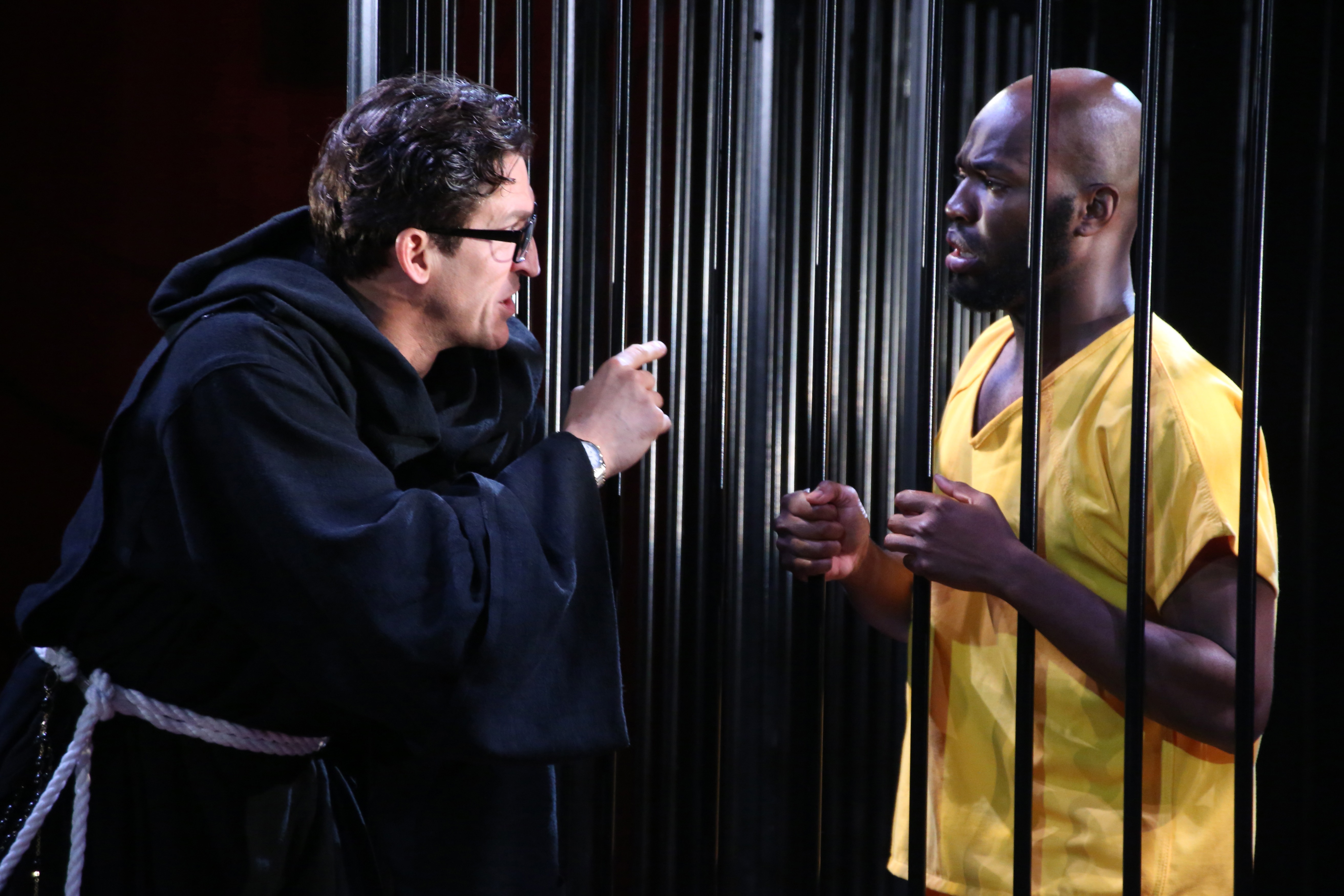Theater Reviews
Measure for Measure at Theater for a New Audience

Laura Kolb (Baruch College)
There are two riveting moments of physical touch in the early scenes between Isabella and Angelo in the Theater for a New Audience’s beautifully realized Measure for Measure. The first comes during their initial encounter. Isabella, on the day she intended to take her vows as a nun, pleads with Vienna’s substitute head-of-state for her brother Claudio’s life. Claudio’s crime is barely a crime at all: he has impregnated his beloved Juliet, to whom he is secretly betrothed. But Angelo has sentenced him to death under an ancient law that has fallen out of use, along with other Viennese laws against sexual license that he has begun enforcing in the absence of the Duke. Played with extraordinary suppleness and grace by Cara Ricketts, Isabella draws a distinction between Angelo’s flawed humanity and the “little brief authority” in which it is temporarily “dressed.” “Go to your bosom,” she exhorts him, “Knock there, and ask your heart what it doth know/ That’s like my brother’s fault.” As she speaks, she presses her hand against his shirt-front. It’s a pure and powerful gesture, meant to force Angelo’s attention inward. Instead, it awakens his fleshly appetite, hitherto so fully suppressed that others call his blood “snow-broth” and his urine “congealed ice.” With Isabella’s hand on his heart, Angelo indeed discovers her brother’s “fault” within himself.
The second moment comes during their next encounter, when Angelo offers to pardon Claudio on the condition that Isabella “yield up thy body to my will.” Up to this point, Thomas Jay Ryan’s Angelo has appeared fastidious, dry, and studiously self-contained. His gestures are limited and precise, his voice clipped and cold. His very posture signals impatience with the exuberant, sloppy, ill-spoken, irreverent Viennese over whom he must rule—an impatience that tilts towards disgust. He applies hand-sanitizer from time to time, a kind of protective barrier between himself and the sticky, messy world. Even when he first realizes his attraction, he seems eager to get further from Isabella—facing away, smoothing his shirt where her hand touched it—rather than moving closer to her. It is startling, then, that when Isabella responds angrily to his proposition (“I will proclaim thee, Angelo, look for’t”), he forcibly grabs her from behind, holds her body against his, and hisses: “Who will believe thee, Isabel?” It’s a horrifying interaction. The moment Angelo discovers his own capacity for physical desire, he thinks and acts only in terms of power: the power of his body to overpower Isabella’s and the power of his voice to silence hers. And it’s horrifying because we see Isabella, at first struggling, then still, make her own awful discovery: that the sense of vocation that lead her to the convent and the sense of justice that led her to plead with Angelo no longer matter. She can no longer determine her own course through the world; she is no longer entirely her own, and she may never be again.

There is clarity and precision to almost every scene in TFNA’s Measure for Measure. I isolate these moments in particular because they illustrate what this production, directed by Simon Godwin, does best: it renders visible for the audience the inward workings not only of characters’ minds, but also of their ever-shifting relationships. We see these people learn and change and come up with crazy plots; we see them make decisions and suffer terrible realizations and experience unexpected happiness. Of course, many productions of many plays are supposed to do exactly this: to externalize the inward, to give us both what is captured in the dramatic language, and what is left unsaid. Seeing it done with unfaltering competence and apparent effortlessness—lightly, swiftly, at the speed of thought—may not be a revelation. But it is a joy.
The combination of nuanced acting, crisp staging, and bright, appealing design (sets and costumes by Paul Wills) works to create this joy again and again—no small feat in a play that contains, on the whole, very little in the way of unmixed happiness for the characters themselves. In an early scene, we see Claudio (Leland Fowler) being led to prison by the Provost (Oberon K.A. Adjepong). The Provost holds Claudio by a long thin rope (pulling against it, the yellow-jumpsuit-clad prisoner looks delightfully and incongruously like a bright balloon), which he tugs to hurry Claudio along, and unspools to let him approach his friend Lucio (Haynes Thigpen). In the movement of the rope, and in Claudio’s corresponding freedom or restriction, we see the Provost’s inward struggle between sympathy for his prisoner and sense of duty. Later, in the prison itself, Isabella tells her brother of Angelo’s offer. It’s is a painful scene: Claudio asks his sister to take the bargain that would more or less destroy her, and Isabella retorts that he deserves to die. Yet here, the dynamics are so well sketched that each line represents a development. At first they cling together, appalled at the awfulness of their situation. Then, Claudio’s voice changes, as he wheedlingly floats the idea that illicit sex cannot really be “damnable” if one “so wise” as Angelo wants it. Isabella responds with fury and disgust. To her, the Duke’s deputy is a monster—he has grabbed her, coerced her, made her feel her own powerlessness as a woman in the world. To hear her brother take his part is more than she can bear. Her “Die, perish!” is the cry of someone hollowed out by betrayal—not a righteous exclamation so much as an existential wail. On the page, Isabella can come across as a prude or a zealot, valuing sexual purity and religious devotion over the messy demands of life in-the-world. Reading this scene, I lose sympathy for Isabella. Watching it, I wept for her.
Moments later, I was beaming, as I witnessed her give her full trust to the Duke (Jonathan Cake), disguised as Friar Lodowick, who has overheard the siblings’ exchange. The improbable scheme he proposes, to send Angelo’s spurned fiancée to his bed in her place, provides Isabella and her brother with a lifeline. More than that, though, Cake’s bouncy, comically optimistic Friar/Duke puts the would-be nun instantly at ease, and it is a pleasure to watch the two collaborate.

What’s remarkable in all this is how carefully and particularly each relationship is realized: the whole is constructed out of its intricate and well-made parts, rather than by conforming to a larger controlling thesis or idea. A prospective theatergoer might expect the company to draw analogies between Shakespeare’s Vienna and America in 2017, given the play’s thematic content: a sudden change in leadership, rule by a sexual predator who claims to embody (and to be above) the law, flashes of religious zeal and hints of a public health crisis and a severe economic divide. On the whole, however, the production sketches its own world, without trying to map itself, point-for-point, to our own.
Which is not to say the show lacks relevance, even urgency. Measure for Measure is a problem play in part because it raises—and refuses to answer—moral and political questions that are perennially relevant, in some eras more sharply than others. These questions, however, emerge from very specific relationships and storylines. Angelo’s hypocrisy, and his conversations with Escala and Isabella raise the question of whether the law can ever be truly impersonal, since it is necessarily embodied in flawed and self-interested persons. The scene of bitter conflict between Claudio and his sister raises the question of what life itself is worth, and what we owe the people we love. The murderer Barnadine’s trajectory raises the question of whether punishment (or forgiveness) can be meaningful, if they cannot effect inward reform. Barnadine (Zachary Fine) refuses to be executed, and his captors all agree that they cannot behead a man in his mindset, since to do so would be to kill soul as well as body. He is finally pardoned by the Duke—in an act that may undermine all the other acts of pardon (pegged, as they are, to the expectation of reform) at the play’s end. And the Duke himself, the irresistible, theatrical, ever-plotting “fantastical duke of dark corners,” raises thorny problems: is rule by surveillance and deception excusable, if it leads to order? Is reform achieved through manipulation any reform at all? Perhaps the play’s biggest, simplest question—how to rule and be a person at the same time—is embodied in the Duke, but also in Angelo, his fellow deputy Escala (January LaVoy), and the Provost. It is in the terrific particularity of these characters, brought to life by these actors, this Measure for Measure’s ‘problems’ come to have immediate, palpable intellectual and emotional weight.
Where Godwin and his company do innovate is in the show’s frames. There are two, and each offers a very different lens through which to see the play’s action. The first precedes the play itself. The audience enters the theater through a labyrinth of red-lit backstage hallways, where shadowy figures draped in gold or dressed in bondage gear smile suggestively and sex toys line the walls. The stage itself, at first, feels continuous with this world: it is set up as a giant banqueting table, heaped with gold tinsel and balloons. As the audience sits, pounding music plays (Jane Shaw’s compositions, played by Drew Bastian, Robert Cowie, and Osei Essed, are a highlight of the show; they include settings of several Shakespeare sonnets), while the backstage figures burst onstage for a lurid dance. At the song’s end, one man is left alone onstage. Looking deflated, he rolls up his sleeve, shoots up, and then pulls the giant table runner over his head and collapses into oblivion. The play opens with this figure—the Duke—waking with a start, to find his counselor Escala bending over him with unsurprised concern; this has happened before. This elaborate frame offers a fresh interpretation of the Duke’s decision to cede power to Angelo. He does not only want to test the other man’s reputation for virtue, or implement strict laws he himself has let go unenforced for many years. He wants to get clean. This interpretation is a mixed success. On the one hand, it presents Vienna as immersive stew of sex and drugs, a city whose pleasures and dangers draw in noble and lowlife (and audience) alike. On the other, it muddies the play’s already murky moral waters, since it makes the Duke into a version of Angelo: an acutely self-aware sinner who nonetheless seeks to flush out and punish others’ sins. As the Duke, Jonathan Cake is kinetic, charming, enormously fun to watch—but in the final scene, in which he reclaims his authority to dole out reprieves and punishments, it’s hard to feel confidence in his rule. We have learned to trust him as a schemer and a plotter and a conjurer-of-schemes, not as the embodiment of justice. He is a magnificent director, but a dubious Duke.

The second frame comes after intermission. The stage has been transformed into a nightclub, with an onstage band and a tousle-headed, honey-voiced chanteuse (Merritt Janson) who purrs into her microphone, “Hello, Vienna… For those that are new—I’m Mariana. Welcome to the Moated Grange.” And then we’re back in the play, as she offers a full-throated rendition of “Take, O, take those lips away.” This re-imagining of Angelo’s spurned fiancée is a stroke of genius, offering something entirely missing from Shakespeare’s text: a positive model of femininity outside of the patriarchal restrictions of marriage, the exploitative economics of the brothel, or the cloistered space of the convent. Shakespeare’s Mariana lives apart—a moated grange is literally a farmhouse surrounded by a moat—but Janson’s is a woman in public, a performer, turning heartbreak into art.
Near the play’s end, the Duke publicly questions Mariana: “Are you married?… Are you a maid?… A widow, then?” She answers no, each time. The duke responds, “Why, you are nothing then.” Measure for Measure lays out the problem of being a woman in a society that defines women primarily in relation to men. They are maids, wives, or widows—or they are whores or nuns. For most of the action of the play, though, Isabella and Mariana occupy none of these roles: the one not quite a nun, the other not quite a wife. For this span of time they are, perhaps, most fully themselves. The ending, then, represents a loss; as it folds them into the marriages, it softens their jagged particularity. The company handles this ending beautifully. Ricketts’ Isabella—silent throughout most of the final scene—responds to the Duke’s offer of marriage with a burst of wordless delight. It feels like the natural outgrowth of her rapport with Lodowick, but also like an active choice: a decision to join life in the world, rather than to seclude herself. By contrast, Janson’s Mariana cannot choose. She loves the awful Angelo, whether she wants to or not. “I crave no other, nor no better man,” she tells the Duke, her voice clear and firm. We may not want her to get what she wants, but the frankness of her love, in the end, feels like a kind of grace. Even the least deserving—even Angelo—may be forgiven.
